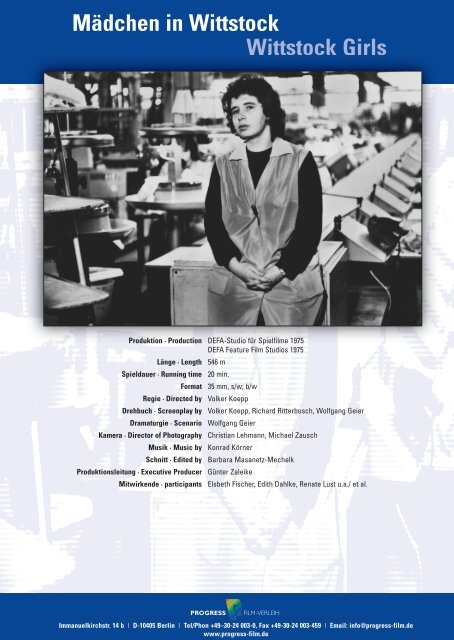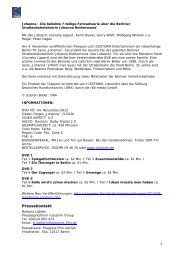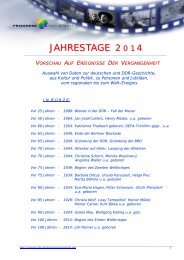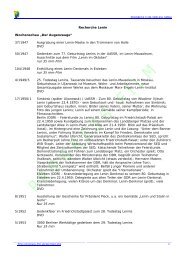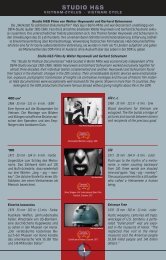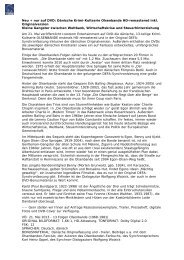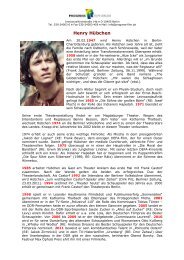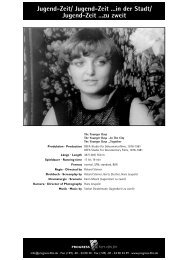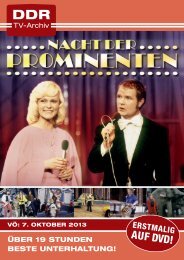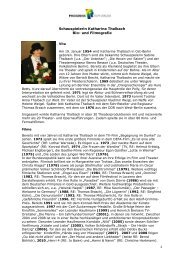DE_FB _5. Serie:* Layout Armin Mueller-Stahl - PROGRESS Film ...
DE_FB _5. Serie:* Layout Armin Mueller-Stahl - PROGRESS Film ...
DE_FB _5. Serie:* Layout Armin Mueller-Stahl - PROGRESS Film ...
Sie wollen auch ein ePaper? Erhöhen Sie die Reichweite Ihrer Titel.
YUMPU macht aus Druck-PDFs automatisch weboptimierte ePaper, die Google liebt.
Mädchen in Wittstock<br />
Wittstock Girls<br />
Produktion · Production<br />
Länge · Length<br />
Spieldauer · Running time<br />
Format<br />
Regie · Directed by<br />
Drehbuch · Screenplay by<br />
Dramaturgie · Scenario<br />
Kamera · Director of Photography<br />
Musik · Music by<br />
Schnitt · Edited by<br />
Produktionsleitung · Executive Producer<br />
Mitwirkende · participants<br />
<strong>DE</strong>FA-Studio für Spielfilme 1975<br />
<strong>DE</strong>FA Feature <strong>Film</strong> Studios 1975<br />
546 m<br />
20 min.<br />
35 mm, s/w; b/w<br />
Volker Koepp<br />
Volker Koepp, Richard Ritterbusch, Wolfgang Geier<br />
Wolfgang Geier<br />
Christian Lehmann, Michael Zausch<br />
Konrad Körner<br />
Barbara Masanetz-Mechelk<br />
Günter Zaleike<br />
Elsbeth Fischer, Edith Dahlke, Renate Lust u.a./ et al.<br />
Immanuelkirchstr. 14 b | D-10405 Berlin | Tel/Phon +49–30-24 003-0, Fax +49-30-24 003-459 | Email: info@progress-film.de<br />
www.progress-film.de
Mädchen in Wittstock<br />
Wittstock Girls<br />
Erste Begegnung mit der Kleinstadt Wittstock an der Dosse: Eine<br />
landwirtschaftlich geprägte Gegend im Norden Brandenburgs befindet<br />
sich im Umbruch. Auf einer grünen Wiese außerhalb der Stadtmauern<br />
entsteht ein ehrgeiziges Großprojekt, das Obertrikotagenwerk<br />
Ernst Lück. Die Riesenausmaße der Textilindustrie bringen einschneidende<br />
Veränderungen für Landschaft und Menschen mit sich.<br />
Bereits über 1000 junge Mädchen leben und arbeiten hier, machen<br />
im wörtlichen Sinne „junge Mode“. Die porträtierten Mädchen nehmen<br />
kein Blatt vor den Mund, sprechen von Anlaufschwierigkeiten,<br />
niedriger Produktivität und hoher Fluktuation. Die junge Schichtführerin<br />
erzählt von ihren Leitungsproblemen, auch mangelnde Freizeitmöglichkeiten<br />
werden diskutiert. Viele Mädchen wünschen sich<br />
einen Freund, aber junge Männer sind rar in Wittstock.<br />
Fast ein Vierteljahrhundert, von 1974 bis 1997, drehte Volker Koepp<br />
in Wittstock an der Dosse. Über diesen langen Zeitraum begleitete<br />
der Regisseur drei Frauen – Renate, Edith und Stupsi – aus einem<br />
Textilgroßbetrieb: Neben individueller Geschichte erfährt der<br />
Zuschauer so Zeithistorisches – von der Industrialisierung, vom<br />
Mauerfall und den Problemen in den ostdeutschen Bundesländern.<br />
Volker Koepp, geb. am 22. Juni 1944 in Stettin (heute Szczecin/<br />
Polen). 1966-1969 Studium an der Deutschen Hochschule für <strong>Film</strong>kunst<br />
Potsdam-Babelsberg. 1970-1991 Regisseur im <strong>DE</strong>FA-Studio<br />
für Dokumentarfilme, seitdem freischaffender Regisseur. Insgesamt<br />
bisher über 50 <strong>Film</strong>e.<br />
<strong>Film</strong>e (Auswahl): „Junge Leute“ (1970); „Grüße aus Sarmatien für<br />
den Dichter Johannes Bobrowski“ (1972); „Gustav J.“ (1973);<br />
„Teddy“ (1973); „Er könnte ja heute nicht schweigen“ (1975);<br />
„Mädchen in Wittstock“ (1975); „Wieder in Wittstock“ (1976); „Das<br />
weite Feld“ (1976); „Hütes-<strong>Film</strong>“ (1977); „Ich erinnere mich noch“<br />
(1977); „Wittstock III“ (1978); „Am Fluß“ (1978); „Tag für Tag“ (1979);<br />
„Haus und Hof“ (1980); „Leben und Weben“ (1981); „In Rheinsberg“<br />
(1982); „Leben in Wittstock“ (1984); „Afghanistan 1362. Erinnerung<br />
an eine Reise“ (1985); „An der Unstrut“ (1985); „Feuerland“ (1987);<br />
„Märkische Ziegel“ (1989); „Wittstock, Wittstock“ (1997)<br />
„Momentaufnahmen, die sich zu einer sensiblen Studie über weibliches<br />
Selbstbewusstsein und Basisdemokratie in der DDR verdichten.“<br />
(<strong>Film</strong>lexikon.de, Stand 2009)<br />
„Der Regisseur findet mit den Wittstock-<strong>Film</strong>en sein eigenes künstlerisches<br />
Profil, welches ihn als Dokumentaristen einzigartig werden läßt. Ihm<br />
gelingen nachdrückliche Zeitdokumente, die vom Leben, den Wünschen<br />
und Träumen der einfachen Menschen berichten.“<br />
(Ines Walk, film-zeit.de, Stand 2009)<br />
„Man mag die Wittstock-<strong>Film</strong>e auch als eine ferne Parabel der DDR deuten:<br />
über das Neue, das so schnell erstarrt ist und die Resignation und die<br />
Lähmung, die folgten.“<br />
(Stefan Reinecke: Die Geschichte eines Lächelns. Die Wittstock-<br />
<strong>Film</strong>e von Volker Koepp – in: Deutsches Historisches Museum<br />
Magazin. Heft 8, 1993)<br />
INHALT · STORYLINE<br />
The first encounter with the small town Wittstock: a mainly agricultural<br />
region in the North of Brandenburg is experiencing a change.<br />
On a meadow outside the town, an ambitious project is taking<br />
shape, the knitting factory Ernst Lück is being build. The gigantic<br />
size of the factory changes the landscape and the lives of the people<br />
significantly. Over one thousand young girls live and work here,<br />
literally producing “Young fashion”. The girls of the Youth Shift do<br />
not mince matters. They talk about initial problems, low productivity<br />
and high fluctuation rates. The young shift leader talks about her<br />
leadership problems, the lack of leisure activities are discussed as<br />
well. Many girls would like to have a boyfriend, but young men are<br />
in short supply in Wittstock.<br />
During almost a quarter of a century, from 1974 to 1997, Volker<br />
Koepp filmed in Wittstock. All this time, the director accompanied<br />
three women – Renate, Edith and Stupsi – from a large textile company:<br />
apart from their individual histories, the audience is presented<br />
historical processes – from the industrialization, the fall of the Wall<br />
and the problems after the reunification.<br />
BIOGRAPHIE <strong>DE</strong>S REGISSEURS · DIRECTOR’S BIOGRAPHY<br />
PRESSESTIMMEN · PRESS COMMENTS<br />
Volker Koepp, born in Stettin (now Szczecin/ Poland) on June 22nd<br />
1944. From 1966 to 1969 film studies at the German Academy for <strong>Film</strong><br />
in Potsdam Babelsberg. 1970-1991 director for the <strong>DE</strong>FA Studios for<br />
Documentary <strong>Film</strong>s, since then freelance director. So far he shot<br />
over 50 films in total.<br />
<strong>Film</strong>s (excerpt): “Young People” (1970); “Greetings From Sarmatia<br />
To The Poet Johannes Bobrowski” (1972); “Gustav J.” (1973);<br />
“Teddy” (1973); “He Couldn't Be Silent Today” (1975); “Wittstock<br />
Girls” (1975); “Back In Wittstock” (1976); “The Vast Field” (1976);<br />
“Keep It” (1977); “I Still Remember” (1977); “Wittstock III” (1978);<br />
“By The River” (1978); “Day By Day” (1979); “Home And Hearth”<br />
(1980); “Living And Weaving” (1981); “In Rheinsberg” (1982); “Wittstock<br />
Life” (1984); “Afghanistan 1362. Memories Of A Voyage”<br />
(1985); “By The Unstrut River” (1985); “Land Of Fire” (1987); “Mark<br />
Brandenburg Brick” (1989); “Wittstock, Wittstock” (1997)<br />
“Snap shots that turn into a sensitive study about female self-confidence<br />
and grassroots democracy in the GDR.”<br />
(<strong>Film</strong>lexikon.de, as of 2009)<br />
“The director finds his own artistic profile with the Wittstock films, making<br />
him a unique documentarian. He produces emphatic documents of the<br />
times relating about life, the wishes and dreams of simple folks.”<br />
(Ines Walk, film-zeit.de, as of 2009)<br />
“You could interpret the Wittstock films as a remote parable of the GDR:<br />
about the new that grew stiff in such a short time and the resignation and<br />
paralysis that followed.”<br />
(Stefan Reinecke: Die Geschichte eines Lächelns. Die Wittstock-<br />
<strong>Film</strong>e von Volker Koepp – in: Deutsches Historisches Museum<br />
Magazin. Issue 8, 1993)


